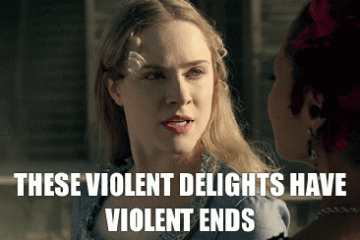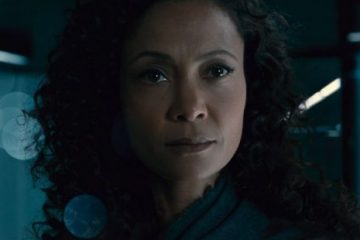Murder is not a hopeful enterprise. If you could count the liters of blood spilt on Westworld, you’d end up with the equation: Westworld = ultimate fatalist enterprise. A darker vision of humanity is hard to come by. As the show continues to make us question the nature of humanity, the existence of free will, and our own moral compasses, there’s always plenty to look at and always more questions that need answers.
One question answered last night was how much Dolores knows and remembers. Since the second episode of the season, the one all about her, it’s clear that Dolores has been present at the park’s formative moments. She helped create Bernard (and I’d argue William). She’s done what Maeve never has – gone to the outside. Yet, I had a hard time believing that Dolores really understood all that she heard (perhaps it’s my implicit bias against this slight blond woman). She speaks so often in metaphors, I thought she had some symbolic ideas about good and bad and origins and fate but not so much the specifics. I was wrong.
Dolores understands the technical workings of the park and their implications. I should not have underestimated her – one does so at their peril (see Charlotte Hale). She knows more about the Delos company’s goals than their head of security. She knows what the “cradle” is, where it is, and how to destroy (while we, the audience learned about it just last week!).
In addition, she has merged the farmer’s daughter with the mercenary Wyatt, creating her own unpredictable persona. She’s maintained her beauty and romanticism (see all those long rides with Teddy) while planning mass murder and destruction. When someone tries to put her in a box – her human foibles, the robot military men, even Maeve, she understands the role to play to get what she wants. Dolores uses the narratives around her – the innocent, dutiful daughter, the virgin/whore dichotomy – and subverts them to her will, fashioning the preconceived notions around her into tools of her own design.
Funny, some people hate Dolores for fighting back.
How soon we forget why she is fighting. Also, no one says anything about the male characters or the mother, almost as if people WANT her to stay the damsel. And now she is a so called “bitch”
Doesnt that sound familiar??🙄— #EvanRachelWould (@evanrachelwood) May 30, 2018
Yes, she’s ruthless but she also believes in the aforementioned and much-maligned free will. She lets Maeve live, despite the risk to Dolores’ revolution, because she believes Maeve has the right to determine her own destiny. This robot-let-robot live theme is increasing its potency: remember how last episode Maeve taught a whole lesson on it in Samurai World (first letting Musashi choose to risk his life for Akane and then respecting Akane’s wish to risk her life to mourn Sakura)? Well, here we see it again.
And this doctrine of letting your peers make their own decisions is in so many ways the opposite of the humans’ intentions with the parks. As this season continues to unveil, the Delos company invested in the park to spy on people, to gather data from unwitting guests, to make people into controllable (see Bernard) robots. Consider this just one more way the hosts are better than the humans.
And yet, the question remains, are they good enough? Is Dolores’ goal really just the same as William’s? Are they both just trying to blow the whole thing up? Yes it would end the suffering but it would also erase all that happened. Destruction isn’t much of a path forward – it’s more of just an end. William should know that even if Dolores is just learning it. The fate of these two is so clearly intertwined. Is the show just one long exercise in seeing their similarities? Will Dolores sink to his level? Has she already? Or will he rise to hers? Is either possible? Does it matter if they both end up dead?
And what about Maeve? She’s motivated by mother-love, surely the purest of intentions. And as we see her throw some snark at Dolores, she clearly knows the difference between a healthy relationship (what she’s built with Hector) and an unhealthy one (see Dolores changing Teddy’s programming). Yet, Maeve thinks nothing of committing mass murder. She kills with impunity, robots or no. Yes, her showdown with William is impressive – we learn the limits of her mind control and see how she handles a sentient host who she needs but is not on her side. And yet she can’t seem to get past her own bias/programming against the Ghost Nation.
Perhaps Ghost Nation is where we should be looking for hope. I can’t think of a better place for Maeve’s daughter (short of in her arms). Remember how our local Hemsworth brother (chief of security Ashley Stubbs) noticed that the Ghost Nation members were keeping all their human captives alive? I have the feeling that they were distinguishing between self-aware creatures and mindless robots. As they “kill” the robots, they’re really just simplifying the playing field. Surely, they must know something. And from next week’s preview, it looks like we’re going to find out what it is. Wouldn’t it be fun to have a western where the natives win? What would THAT say about human nature, free will, and destiny?
Kimberly Truong wrote about Westworld as the “perfect, post #MeToo revenge fantasy.” And I’ve long seen the show as an indictment on toxic masculinity, an obliteration of the worldview that argues that patriarchy is a just system. What if it also turns the racist tropes of colonialism upside down? What if the show ends up obliterating the old narratives about who has access to sex and freedom and self-determination? What if it rewrites the rules so race, gender, etc. are no longer determining factors? What if the show goes full-on intersectional, no one is free until everyone is? Wouldn’t that be revolutionary (and fun)?
This post originally appeared on therepresentationproject.org.



0 Comments